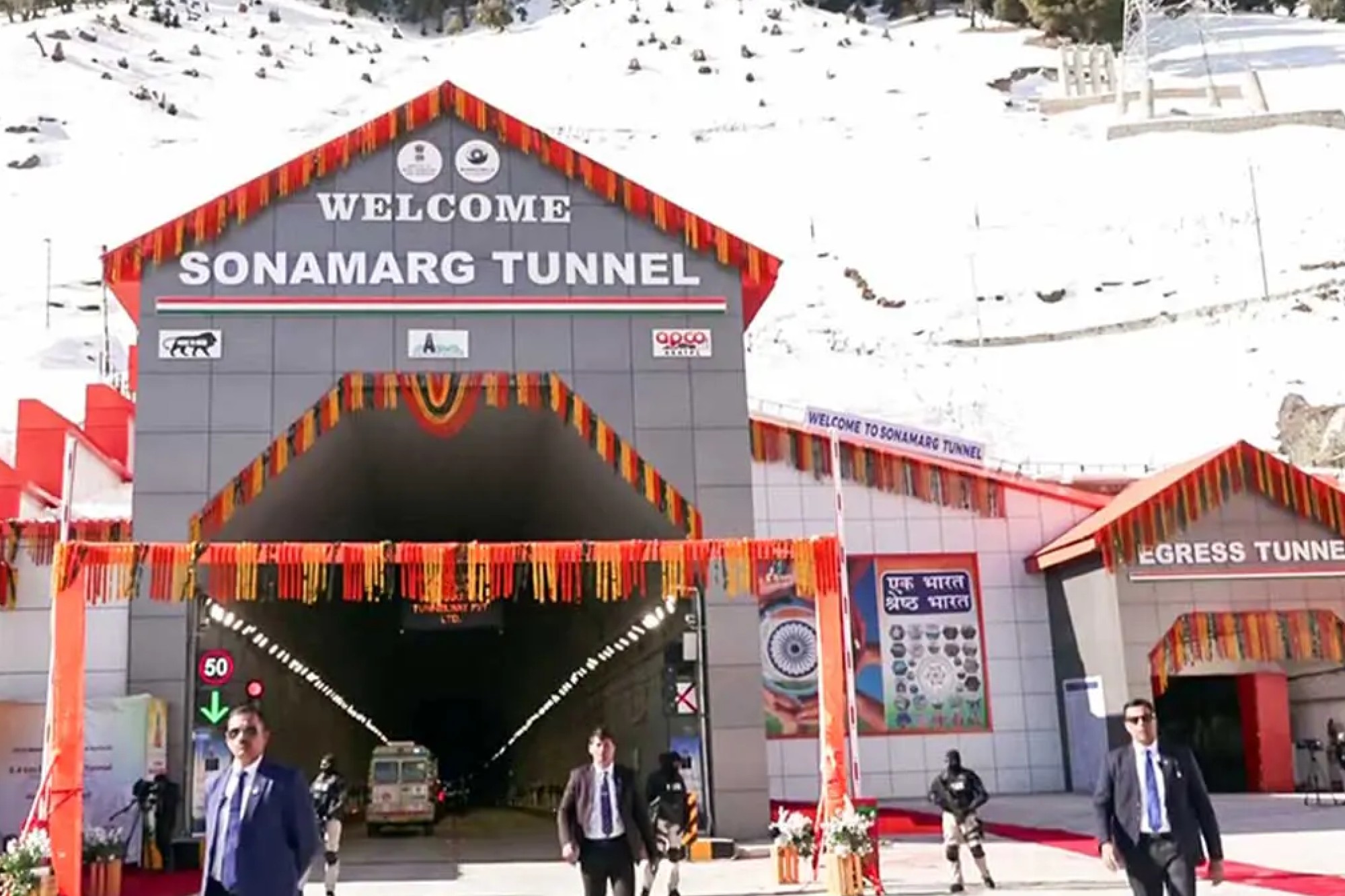Union Budget 2024: Boosters for construction and infrastructure
By Edit Team | July 24, 2024 11:22 am SHARE

Finance Minister Nirmala Sitharaman, presenting her seventh budget, unveiled a series of significant initiatives that promise to be game-changers for the construction and infrastructure industry.
The budget underscores the government’s unwavering commitment to fostering development, enhancing connectivity, and driving growth across various sectors, with a keen focus on employment and skilling. For the construction and infrastructure industry, this budget unveiled several key takeaways that promise to drive growth and development in the years to come.
Major allocations and infrastructure focus
One of the standout announcements was the massive allocation for capital expenditure. “Significant investment the Central Government has made over the years in building and improving infrastructure has had a strong multiplier effect on the economy,” Sitharaman stated. For the fiscal year, the government has provided a staggering INR 11,11,111 crore for capital expenditure, which is 3.4 percent of the GDP. This move underscores the government’s commitment to bolstering infrastructure as a catalyst for economic growth.
Recognising the importance of collaborative development, the budget encourages states to match the central government’s infrastructure efforts. “We will encourage states to provide support of similar scale for infrastructure, subject to their development priorities,” Sitharaman said. To aid this, ₹ 1.5 lakh crore has been provisioned for long-term interest-free loans to states, helping them align their resources and priorities with national goals.
Aparna Reddy, Executive Director of Aparna Enterprise Ltd, views the budget’s record-breaking allocation for capital expenditure as a strong commitment to infrastructure development. She asserted that improved rural connectivity will drive demand for construction materials and housing, creating a ripple effect throughout the building materials industry. Sanjay Gupta, Chairman & Managing Director of APL Apollo Tubes Limited, expresses enthusiasm for the budget’s commitment to infrastructure development. He highlights the significant allocation of resources toward infrastructure projects as a game-changer for industries like structural steel, which are poised to benefit from enhanced connectivity and new opportunities.
Enhancing connectivity and power
In a significant boost to Bihar’s infrastructure, the budget outlined several key projects. The development of road connectivity projects, including the Patna-Purnea Expressway, Buxar-Bhagalpur Expressway, and additional spurs in Bodhgaya, Rajgir, Vaishali, and Darbhanga, has been allocated INR 26,000 crore. Additionally, the construction of a new 2400 MW power plant at Pirpainti will commence with an investment of INR 21,400 crore. New airports, medical colleges, and sports infrastructure are also set to be developed, marking a comprehensive push towards modernising the state’s infrastructure. KK Agarwal, CMD of CJ Darcl Logistics Ltd, highlighted these initiatives, noting, “Critical Road Connectivity projects like Patna-Purnea & Buxar-Bhagalpur Expressway, along with the Industrial node at Gaya, epitomise the spirit of ‘Vikas bhi, Virasat bhi’.”
Amit Sharma, Managing Director & CEO of Tata Consulting Engineers, applauds the budget’s focus on green growth, with substantial investments in clean energy and sustainable development. He emphasizes that initiatives like the Bharat Small Modular Reactor and Pumped Storage Projects will drive the energy transition, aligning with global standards and fostering innovation in green finance markets. B. Santhanam, CEO of Saint-Gobain India and APAC, sees the budget as a significant stride towards balanced growth, with a focus on job creation, infrastructure development, and self-reliance. He appreciates the emphasis on completing key projects and the investment in industrial corridors, MSME credit, and PM Awas Yojana Urban 2.0, viewing them as drivers of economic growth and social welfare.
Rural development and employment
The Finance Minister’s announcement of INR 2.66 lakh crore for rural development, including rural infrastructure, reflects a significant investment in enhancing India’s rural landscape. “Starting from the introduction of the Jan Samarth-based Kisan Credit Card and the support for Andhra Pradesh, Bihar, and other key regions, the government’s holistic approach to infrastructure, skilling, and rural development are vital initiatives,” noted Shalabh Chaturvedi, Managing Director of CASE Construction Equipment – India & SAARC region.
This budget also places a strong emphasis on promoting employment and skilling. An allocation of INR 2 lakh crore for various schemes targeting job creation and skill development aims to create a workforce ready to meet the demands of modern infrastructure projects. “The various schemes for employment-linked incentives and skilling programs will create a skilled workforce ready to meet the demands of modern infrastructure projects,” added Chaturvedi.
Private sector participation and urban development
Encouraging private sector investment in infrastructure through viability gap funding and enabling policies is a cornerstone of this budget. Kavita Shirvaikar, Acting Managing Director of Patel Engineering Limited, praised this move: “Encouraging private sector participation through viability gap funding and market-based financing frameworks will foster a dynamic environment for infrastructure advancements.”
Furthermore, the launch of Phase IV of the Pradhan Mantri Gram Sadak Yojana (PMGSY) aims to provide all-weather connectivity to 25,000 rural habitations. This initiative is crucial for integrating rural areas into the national economic framework, fostering inclusivity and growth at the grassroots level.
The budget also places a strong emphasis on urban development. Prashant Sharma, President of NAREDCO Maharashtra, highlighted the significant steps towards affordable housing and urban infrastructure: “The government’s commitment to making housing more affordable, with an INR 2.2 lakh crore push under the PM Awas Yojana-Urban, is a significant step forward. Addressing the housing needs of one crore poor and middle-class families reflects a robust and inclusive approach to urban development.”
Safety and skilling in the construction sector
Employment and skilling form the bedrock of sustained infrastructure development. Dr. Vikram Mehta, MD of SPARTAN Engineering Industries Pvt. Ltd emphasised the importance of safety and skill development: “The significant reforms announced by our Finance Minister in the areas of employment, women empowerment, skill development, and support for MSMEs represent a progressive India on the global stage.” A significant portion of the budget is dedicated to employment and skill development, with an allocation of INR 2 lakh crore. The budget’s focus on creating job opportunities for 30 lakh youths in manufacturing and supporting skilling programs for 20 lakh individuals is expected to boost productivity and enhance infrastructure development. Ashwin Sheth, Chairman and Managing Director of Ashwin Sheth Group, acknowledged these efforts, stating, “The comprehensive focus on efficient urban planning and skill development will elevate the quality of urban living and support the real estate sector.”
A vision for ‘Viksit Bharat’
Prakash Chhabria, Executive Chairman of Finolex Industries Limited, welcomes the budget’s focus on job creation, women’s empowerment, and sustainable practices. He highlights the budget’s holistic approach to water resource management and its potential to drive growth in the pipe and fittings industry.
The overarching theme of the budget is the pursuit of ‘Viksit Bharat’ (Developed India). Sitharaman outlined nine priorities, including urban development, infrastructure, and innovation, which will guide the government’s sustained efforts. “This budget details some of the specific actions to be initiated in the current year towards fulfilment of these priorities with potential for transformative changes,” she emphasised.
Industry leaders have lauded the Union Budget 2024 for its comprehensive and forward-looking approach. Rajan Aiyer, Vice President and Managing Director of Trimble, South Asia Region, commented, “The increased focus on infrastructure development and rural upliftment will significantly benefit the infrastructure and construction industries, driving growth and innovation.”
“The budget’s emphasis on infrastructure and urban development offers significant opportunities for startups and construction companies,” said Aaditya Sharda, Co-founder of Infra. Market. He pointed to initiatives like ‘Cities as Growth Hubs’ and the abolishment of the Angel tax for all investors, which will strengthen the startup ecosystem and spur innovation across sectors.
Gul Basantani, Partner at Forvis Mazars in India, echoed these sentiments, stating, “The substantial capital expenditure and efforts to encourage private investment are set to transform the industry landscape significantly.”
Amit Sharma, Managing Director & CEO of Tata Consulting Engineers, praised the budget’s focus on green growth with a ₹ 35,000 crore investment. He highlighted the adoption of clean energy projects and private participation in the nuclear energy arena as transformative steps towards a sustainable energy transition.
Anil Agarwal, Chairman of Vedanta Ltd, commends the budget for its focus on job creation and the abolition of angel tax, which will boost startups and young entrepreneurs. He highlights the commitment to speeding up IBC resolution and the announcement of the Critical Minerals Mission as key measures for economic growth.
Sandeep Mohanty, Partner and Leader – Climate & Sustainability Strategy at PwC India, appreciates the budget’s focus on climate finance taxonomies. He sees them as crucial for fostering innovation, enhancing international cooperation, and stimulating green finance markets, which will aid in planning and developing infrastructure resilient against climate change.
The Union Budget 2024 is a strategic and ambitious roadmap for India’s infrastructure and construction sectors. As Finance Minister Nirmala Sitharaman aptly put it, “Significant investment the Central Government has made over the years in building and improving infrastructure has had a strong multiplier effect on the economy.” This budget continues that legacy. By addressing connectivity, power, state collaboration, private investment, safety, job creation and skilling, it sets the stage for a more resilient and inclusive economic future. As these initiatives unfold, the construction and infrastructure industry stands poised to play a pivotal role in driving India towards its goal of ‘Viksit Bharat.’
Cookie Consent
We use cookies to personalize your experience. By continuing to visit this website you agree to our Terms & Conditions, Privacy Policy and Cookie Policy.








































































